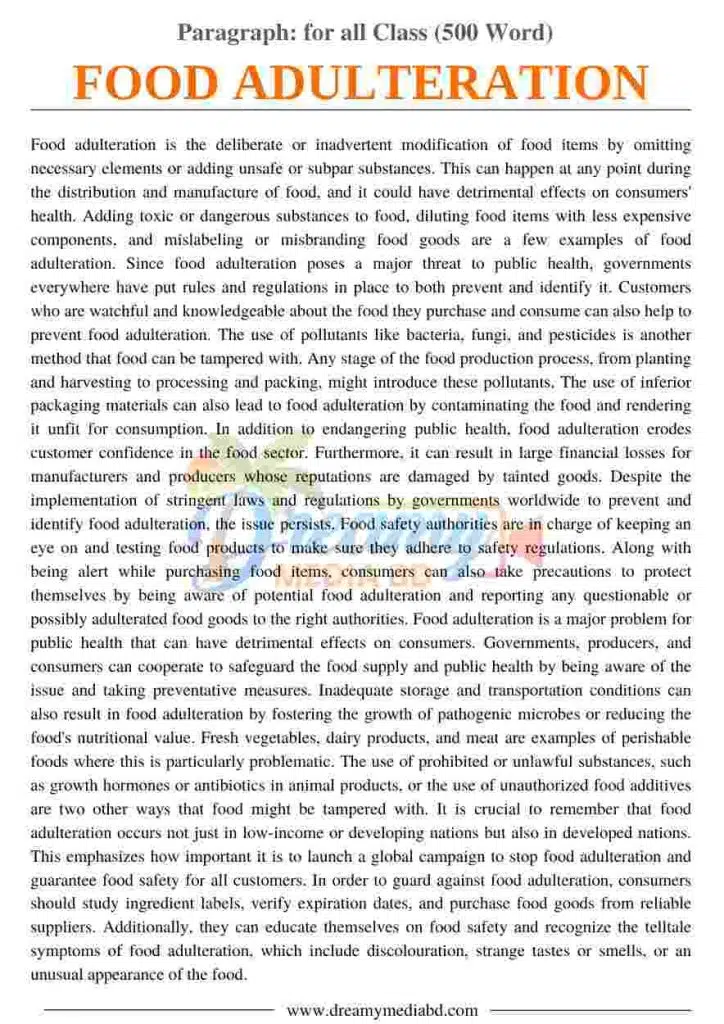Food Adulteration paragraph for hsc 12 ssc 9 10 8 7 6 5 4 3 2 | food adulteration paragraph in 300 250 200 150 100 words. We refer to food as human fuel. The body’s most delicate part is consumed by humans. Food adulteration is essentially the process of introducing chemical compounds to pure foods to change their genuine quality
Food Adulteration Paragraph | for all class (100 Word)
One of the necessities for human existence is food. We obtain heat and energy from food. It is beneficial for earthly survival. But there is adulteration in our food. Food adulteration is the process of preparing food by combining it with another material or chemical, which reduces the food’s purity and renders it unhealthy for consumption. Food is flavored with chemicals to enhance its appeal. In this way, food loses its standard and purity. Consuming these meals makes us sick. It impairs the body’s ability to fend off illness. Adulteration of food affects every man. Children are the most vulnerable to it, though. Melanin, a deadly toxin, has just been discovered in milk powder. The only people accountable for adulteration are the unscrupulous businesspeople. To punish them, the government recently built up mobile courts. To end food adulteration, the government should take the appropriate actions.
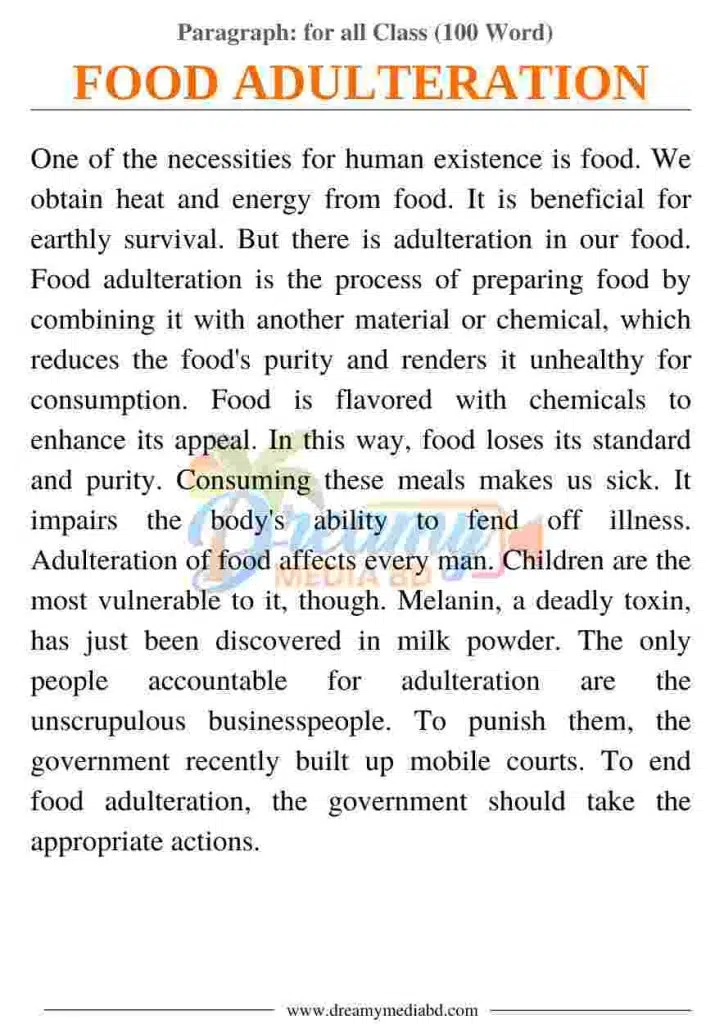
Read More: Drug Addiction Paragraph
Food Adulteration Paragraph | for all class (200 Word)
Without food, man cannot survive. It is necessary for both life and wellness. However, the food must be fresh, pure, and clean. Foods these days are frequently tampered with. Stale and rotting food is combined with fresh food at hotels and restaurants before being served to patrons. Fish and vegetables are combined with toxic chemicals and preservatives to make them appear fresh. Products used in bakeries and confectioneries are also made with harmful ingredients, which leads to adulteration. Junk food is full with dangerous substances. Fruits, milk, and drinks are also tampered with. Actually, a variety of foods and food items are tampered with by dishonest and avaricious businesspeople and retailers in an attempt to make rapid, unjustified profits. Food adulteration poses a major risk to public health. They can result in death and several deadly illnesses. In our nation, food adulteration has grown to be a concerning issue. Managing contaminated food is a serious offense. It is necessary to identify and prosecute the offenders. It is important to raise public knowledge so that people are cautious while purchasing food and food-related items. It is important to make sure that dishonest and avaricious food vendors are despised in the community. The government’s relevant departments should step up their efforts and maintain a constant state of vigilance against adulteration. The fact that our government has taken the necessary action to resolve this issue, prosecute the offenders, and protect the public from this horrible epidemic is heartening.
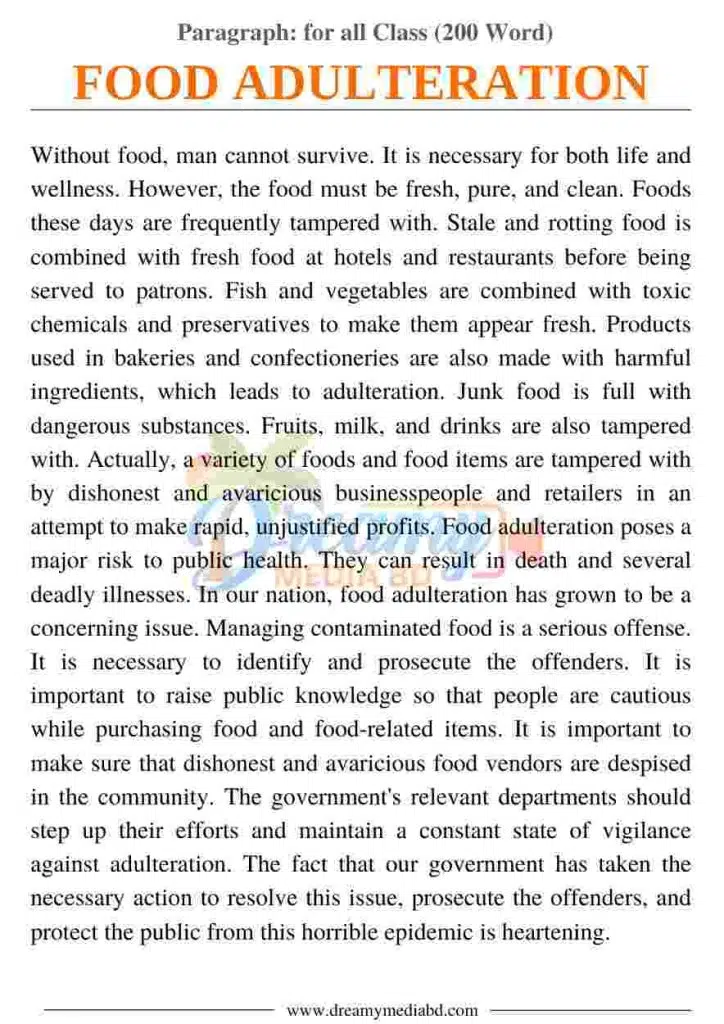
Food Adulteration Paragraph | for all class (300 Word)
Food adulteration is the practice of adding or combining another substance with food in an effort to increase revenue, prolong its shelf life, or enhance its appeal. It creates health risks and lowers the actual quality of food items. It’s regarded as one of the main issues facing our nation. Food that has not been tampered with in any form is rare to come by. Adulterated food has a lot of negative effects. In general, they are unhealthy and can lead to major health issues like cancer, kidney failure, heart problems, diarrhea, dysentery, and digestive issues. All that the tainted food is is slow-acting poison that kills victims gradually. These days, food adulteration is so pervasive in our nation that it is challenging to locate food that is safe to consume. Poor processing practices apply to milk and milk products, pesticides are used on vegetables, formalin is used to preserve fish, and harmful chemicals are used to preserve fruits. According to a recent survey carried out in certain parts of Dhaka city, DDT, Aldrin, and other harmful chemicals were found in 40% to 82% of the samples of milk products, fish, fruits, and vegetables. It is well established that stringent oversight and supervision during the manufacturing process can significantly reduce food adulteration. Finding and prosecuting the culprits is essential. It’s critical to increase public awareness so that consumers are cautious while making food and food-related purchases.The government cannot stop the pervasive adulteration of food on its own. When a product is found to be contaminated, the general public should be informed and encouraged to boycott it. The government must also pass strong legislation prohibiting adulteration. The dishonest traders who adulterate food should be guaranteed the death penalty.
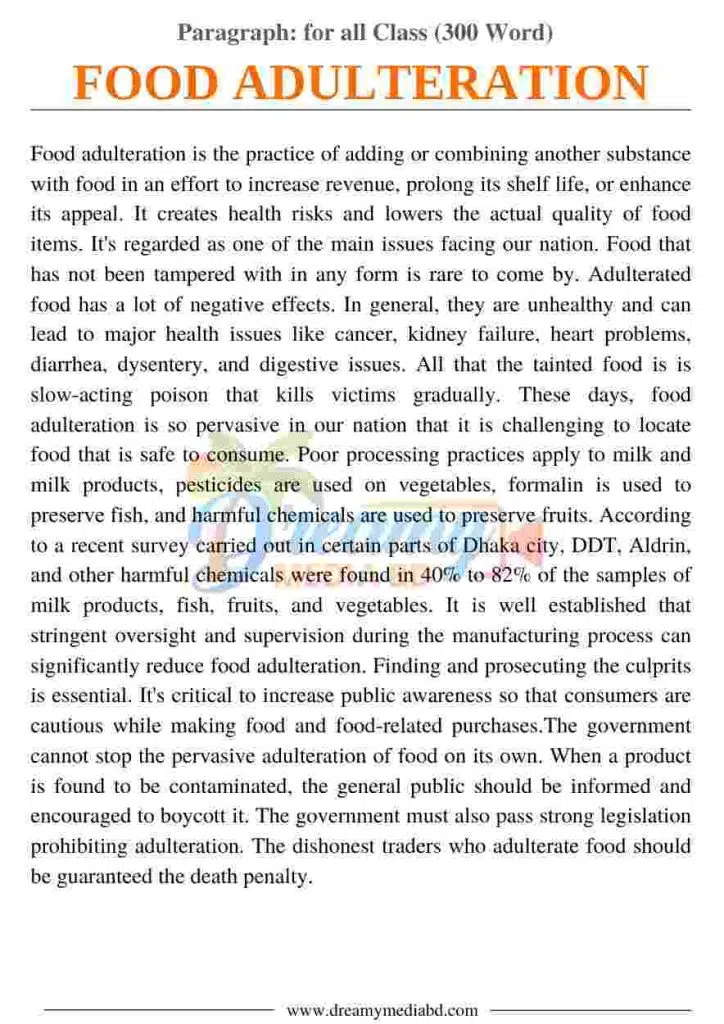
Food Adulteration Paragraph | for all class (400 Word)
The most basic need for survival is food. To acquire enough food to satiate one’s hunger, one must work hard and earn money. But the question that needs to be addressed is: Are our foods safe and fresh? Alternatively, are we eating tainted and corrupted food? Food adulteration is the process of lowering the quality of food by adding components of lower quality or by removing useful particles. Food adulteration has grown to be a concerning issue in the majority of emerging nations, including our own. There is very little unadulterated food available in our Bangladeshi bazaar. Horse or cow manure powder is added to dhania powder to tamper with it, just as water and chemical mixtures including urea and other substances are used to adulterate milk. In a similar vein, hot chili powder is mixed with brick powder, and rice is tainted with stones. Paraffin wax, hydrocarbons, and castor oil make up the majority of the cooking oils, butter, and margarine used locally. To make fish and animal meat appear fresh and plump, chemicals and other preservatives are added. After being refilled with tubewell water, mineral water bottles are sold to passengers who are thirsty. In many tiny eateries and motels, fresh food is combined with stale and rotting food before being offered to patrons. Food adulteration is a practice carried out by ill-mannered people seeking quick and easy money. These folks have no regard for other people’s life or well-being. Occasionally, we put ourselves in a position where the traders can feed us tainted food. The dealers and suppliers of food items take advantage of the fact that every consumer wants to receive superior quality and quantity of food items at reduced prices. To increase the amount of food and thus enhance their profit margin, they turn to adulterating it. Whether done on purpose or accidentally, adulterating food is a deadly crime against humanity. Food that has been tainted is unclean, dangerous, and can lead to major health problems like cancer, mental illnesses, food poisoning, ulcers, asthma, and paralysis. To maintain an eye on the quality of food items that are offered in the market, our government established a number of regulations, including the Food items Orders and the Prevention of Adulteration of Food Acts and Rules. Although there are various regulations in place to prevent food adulteration, they are rarely implemented, just like the majority of societal rules. Furthermore, the laws that are in place to prevent food contamination are insufficient. The people should be made aware of food adulteration by the government. This will empower the general public to exercise extreme caution while purchasing food items from vendors.
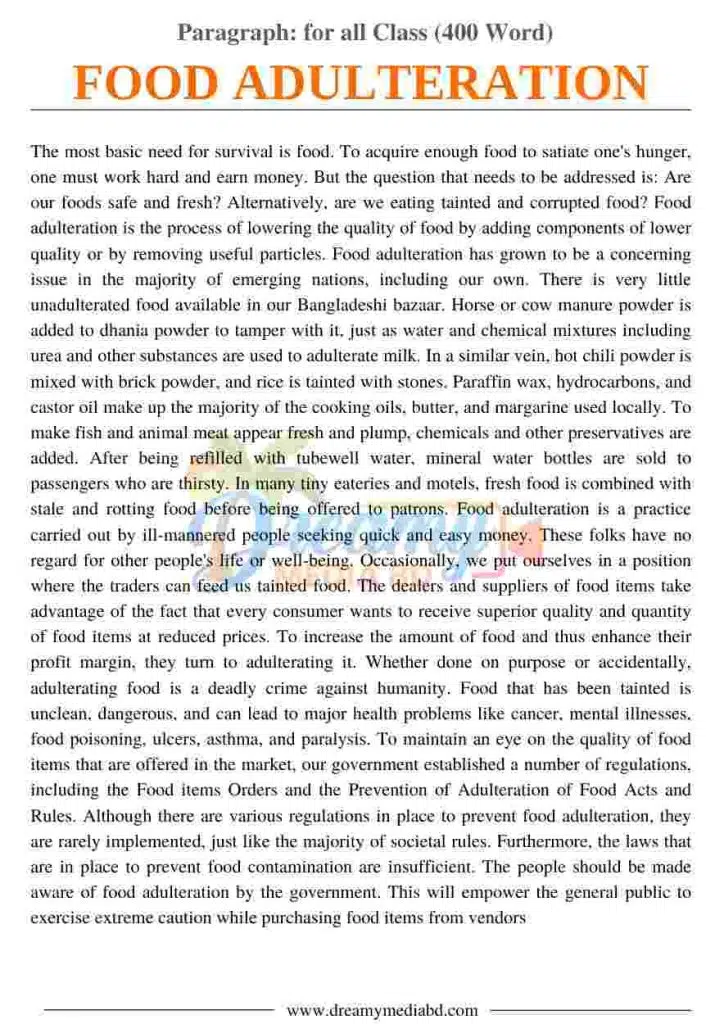
Food Adulteration Paragraph | for all class (500 Word)
Food adulteration is the deliberate or inadvertent modification of food items by omitting necessary elements or adding unsafe or subpar substances. This can happen at any point during the distribution and manufacture of food, and it could have detrimental effects on consumers’ health. Adding toxic or dangerous substances to food, diluting food items with less expensive components, and mislabeling or misbranding food goods are a few examples of food adulteration. Since food adulteration poses a major threat to public health, governments everywhere have put rules and regulations in place to both prevent and identify it. Customers who are watchful and knowledgeable about the food they purchase and consume can also help to prevent food adulteration. The use of pollutants like bacteria, fungi, and pesticides is another method that food can be tampered with. Any stage of the food production process, from planting and harvesting to processing and packing, might introduce these pollutants. The use of inferior packaging materials can also lead to food adulteration by contaminating the food and rendering it unfit for consumption. In addition to endangering public health, food adulteration erodes customer confidence in the food sector. Furthermore, it can result in large financial losses for manufacturers and producers whose reputations are damaged by tainted goods. Despite the implementation of stringent laws and regulations by governments worldwide to prevent and identify food adulteration, the issue persists. Food safety authorities are in charge of keeping an eye on and testing food products to make sure they adhere to safety regulations. Along with being alert while purchasing food items, consumers can also take precautions to protect themselves by being aware of potential food adulteration and reporting any questionable or possibly adulterated food goods to the right authorities. Food adulteration is a major problem for public health that can have detrimental effects on consumers. Governments, producers, and consumers can cooperate to safeguard the food supply and public health by being aware of the issue and taking preventative measures. Inadequate storage and transportation conditions can also result in food adulteration by fostering the growth of pathogenic microbes or reducing the food’s nutritional value. Fresh vegetables, dairy products, and meat are examples of perishable foods where this is particularly problematic. The use of prohibited or unlawful substances, such as growth hormones or antibiotics in animal products, or the use of unauthorized food additives are two other ways that food might be tampered with. It is crucial to remember that food adulteration occurs not just in low-income or developing nations but also in developed nations. This emphasizes how important it is to launch a global campaign to stop food adulteration and guarantee food safety for all customers. In order to guard against food adulteration, consumers should study ingredient labels, verify expiration dates, and purchase food goods from reliable suppliers. Additionally, they can educate themselves on food safety and recognize the telltale symptoms of food adulteration, which include discolouration, strange tastes or smells, or an unusual appearance of the food.
Read More: Our National Flag Paragraph
